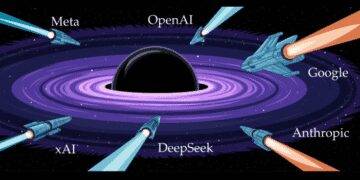The year 2025 represents a pivotal turning point in global development, as artificial intelligence (AI) will reshape our contemporary world. It is capable of thinking, planning, and finding solutions in the most complex situations.
Most companies are moving toward automation, outsourcing many tasks to it, such as managing daily schedules, personalizing healthcare for each individual, and even managing supply chains with high efficiency.
The following are the most prominent tasks that will see a boom as AI takes over and improves their performance.
Automation and Efficiency:
By 2025, AI agents will be able to take over routine and complex tasks in many businesses, managing schedules, monitoring communications, and processing workflow. For example, agents can assist users in drafting emails, scheduling meetings, or even analyzing data, saving time and reducing human error.
Personalization:
AI agents can be leveraged in e-commerce through machine learning to deliver personalized experiences, such as product recommendations based on user behavior and purchase history.
In education, they can customize learning plans based on a student’s strengths and weaknesses.
Augmented Decision-Making:
AI agents will act as advisors, providing data-driven insights in fields such as healthcare, particularly in helping doctors diagnose diseases, or in finance, where their ability to quickly process massive amounts of data will enhance the ability to make more accurate decisions.
Human-AI Collaboration:
Rather than replacing humans, these agents will work as partners, enhancing creativity and productivity. For example, in the creative industries, AI programs can prepare initial drafts of writing or design, which are then refined by human experts.
Social and ethical impact:
As reliance on AI programs increases, a range of issues will arise, such as privacy, algorithmic bias, and the lack of jobs available to humans. Regulations and an ethical framework will be essential to ensure the responsible use of these technologies.
The most popular AI agent applications
AI agent applications are increasingly permeating major industries. Here’s the impact they can have, practical examples of these applications, and the challenges they may face:

Healthcare
AI is highly effective in diagnosing diseases and analyzing medical data, as follows:
- AI agents can analyze medical data such as radiographs and patient records to support doctors in accurately diagnosing diseases.
- They can monitor patients in real-time using wearable devices and alert healthcare providers if abnormalities, such as an irregular heartbeat, are detected.
- AI agents help accelerate drug discovery by simulating molecular interactions, reducing the time and cost of clinical trials.
- Virtual assistants: AI-powered chatbots provide initial consultations, answer patient inquiries, and assist in scheduling appointments.
Challenges: Protecting patient data and confidentiality.
Retail and E-commerce
- AI agents use analysis of customer behavior, such as browsing or purchase history, to provide personalized product recommendations, increasing sales.
- Customer Service: AI-powered chatbots operate 24/7 to answer customer inquiries, handle complaints, and track orders.
- Inventory Management: AI agents improve inventory management by forecasting demand based on market trends and seasonal patterns.
- Dynamic Pricing: AI agents adjust prices in real-time based on supply, demand, and competitor behavior.
Challenges: Interactions with chatbots can feel impersonal if they aren’t carefully designed.
Education
- AI agents provide tailored learning plans based on a student’s needs and pace.
- AI agents act as virtual coaches, answering questions, providing explanations, and administering interactive tests.
- AI agents grade tests and provide immediate feedback, saving teachers time.
- AI agents assist students with special needs through tools such as text-to-speech or adaptive learning.
Challenges: Students in resource-limited areas may not have access to AI tools.
Logistics and Supply Chain
- AI agents use real-time data such as traffic or weather to optimize delivery routes, reducing fuel consumption and time.
- AI agents predict demand and manage inventory levels to reduce waste and increase efficiency.
- AI agents manage automated warehouses, where robots coordinate picking and packing operations.
- AI agents detect potential supply chain disruptions such as shipping delays and suggest solutions.
Challenges: AI technologies can be expensive for small businesses.
Media and Entertainment
- AI agents assist with writing scripts, composing music, or editing videos.
- Platforms like Netflix and Spotify use AI agents to recommend movies or songs based on user preferences.
- AI agents precisely target audiences through data analysis.
Challenges: AI-generated content may raise copyright issues.
Financial Services
- AI agents provide personalized investment advice based on market analysis and client goals.
- AI agents monitor transactions in real time to detect suspicious activity.
- AI-powered chatbots manage client inquiries about accounts and loans.
- AI agents use algorithms to execute trades based on market trends.
Challenges: Sensitive financial data must be protected from breaches, and AI agents must comply with strict financial regulations.
Industry
- AI agents monitor machine performance and predict failures before they occur.
- AI agents use computer vision to detect product defects during production.
- AI agents analyze data to improve the efficiency of production lines.
Challenges: Legacy systems may not be compatible with AI technologies and can be expensive for small factories.
AI Applications in Agriculture
AI agents use data from sensors, satellites, and drones to analyze soil conditions, weather patterns, and crop health. This enables farmers to make accurate decisions about irrigation, fertilization, and pest control to reduce resource waste, increase crop yields, and lower costs.
Challenges:
- AI technologies, such as drones, sensors, and software, require significant initial investment, which can be a barrier for small farmers, especially in developing countries.
- Farmers in rural areas may face challenges in accessing the internet and AI applications.
- Farmers need training to use AI technologies effectively.
- Traditional agricultural equipment may not be compatible with modern AI technologies.
Notes
Within a few years, AI agents will transform life on Earth by enhancing efficiency, personalizing experiences, and improving decision-making.
Despite the challenges these technologies face, such as privacy, bias, and costs, they require innovative solutions and strict regulations.
Ultimately, however, AI will succeed and improve quality of life by balancing automation with human interaction, ensuring that AI is used as a tool to enhance human potential, not replace it.
Also read:
a-self-driving-tesla-taxi-crashes-into-a-parked-vehicle
a-chinese-humanoid-robot-cooks-using-virtual-reality
brain-computer-interfaces-when-telepathy-becomes-a-technological-reality



















